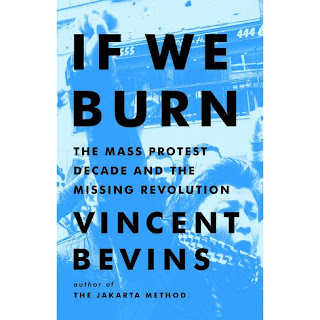Among the things that is great about it is the honesty, and the willingness to face the truth - that those protests achieved very little of what the organisers intended, and that the fallout from them often achieved the very opposite. For example, in Brazil the mass protests against transport fare increases, organised by libertarian socialists and anarchists, ended up creating an opportunity for the far right through which Bolsanaro marched to victory.
The last two chapters are analytical, in which Bevins attempts some synthesis and reflection of all that went wrong. This is mostly great, except that there's not enough of it. He's rightly critical of "leaderless" and "horizontal" forms of organisation, and comes across as a reluctant convert to Leninism - though those aren't the only options, are they?
He's also very good on the limits of "protest" as a strategy for opposition movements, and how muddle-headed it is to expect serious change to come from protest.
I hope he writes another book soon, with more learnings, and maybe a bit less grinding detail about who turned up where.


No comments:
Post a Comment